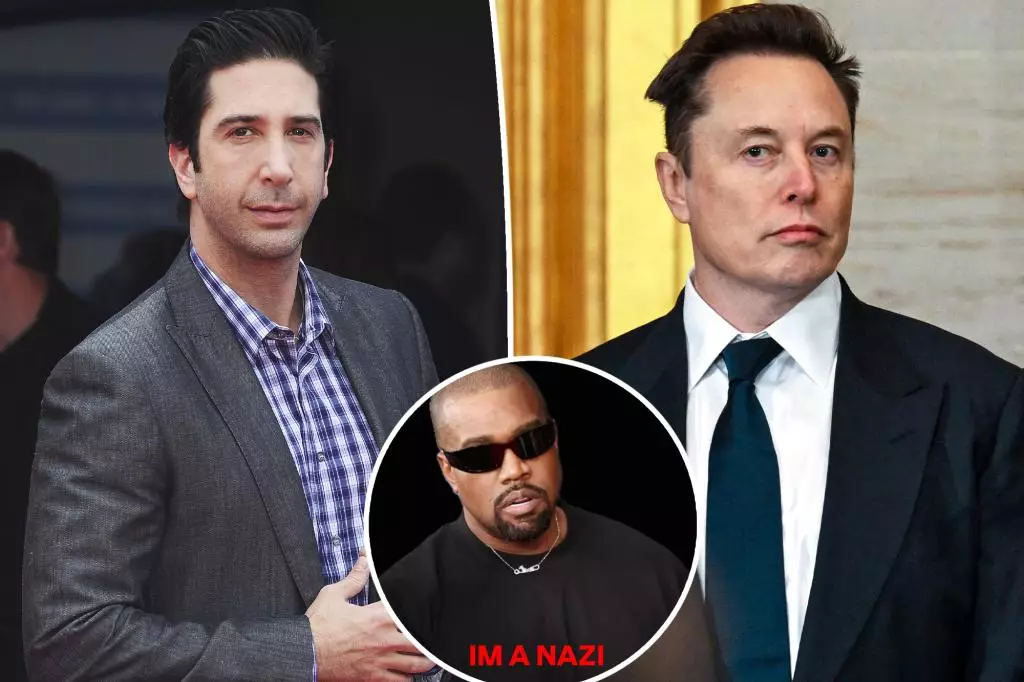In an era dominated by social media, the actions and words of public figures can have profound implications for societal attitudes and behaviors. The recent outburst from rapper Kanye West, who has taken to the platform X (formerly Twitter) to express a barrage of antisemitic sentiments, serves as an alarming reminder of the dangerous potential of unchecked hate speech online. With the ability to reach millions at the click of a button, the question arises: how responsible are social media platforms for the rhetoric propagated across their sites?
Recent events escalated when actor David Schwimmer publicly addressed West’s offensive remarks. The “Friends” star used his platform to urge X’s owner, Elon Musk, to take decisive action against West, referring to his powerful outreach as a “megaphone” for hate. Schwimmer’s statement was significant not just for its contents but for its symbolic stance against the recent rise in antisemitism and bigotry. He boldly articulated the fear many hold—that such rhetoric doesn’t just stay on the internet but feeds into real-world violence and discrimination.
Schwimmer’s plea brought to light an essential aspect of contemporary discourse: silence in the face of hate can be interpreted as complicity. It represents a growing frustration with the inaction of social media companies that often prioritize profit over moral responsibility. Although Schwimmer’s voice was among those calling for action, there are countless others who feel similarly, demanding accountability for platforms that allow hate speech to fester.
Kanye West, who has recently rebranded himself as “Ye,” has consistently courted controversy, but his latest tirade raises the stakes. He openly dismissed Jewish communities in a series of inflammatory tweets, characterizing his statements as sober truths rather than the remorseful ramblings of a troubled mind. The alarming content of his remarks—claims of Jewish people inherently being untrustworthy and an unhealthy obsession with praising Adolf Hitler—aligns disturbingly well with historical bigotry and serves to amplify harmful stereotypes.
West’s claims are more than mere words; they reflect a damaging narrative that has persisted across generations. The propagation of such stereotypes can fuel societal divisions, promote misunderstandings, and ultimately lead to violence against marginalized communities. With a platform boasting over 32 million followers, every word West articulates carries the weight of influence that could embolden others to adopt similar negative mindsets.
The responsibility of moderating hate speech falls heavily on social media platforms. While some advocates would argue for complete freedom of expression, it is essential to recognize that rights come with responsibilities. Instead of fostering a free-for-all environment, platforms like X must implement stronger policies to monitor and control malicious content. The concept of community safety should be prioritized, moving beyond mere attempts at damage control.
Such a shift in policy entails not only effectively banning repeat offenders but also creating a proactive framework for education and awareness to combat hate speech. This would involve collaboration with organizations dedicated to fighting antisemitism and promoting understanding among different cultures. Furthermore, users must easily report harmful content and see tangible actions taken in response.
As citizens of a connected digital age, individuals play a vital role in shaping the community’s discourse. It is crucial to collectively condemn hate speech and promote tolerance and understanding. David Schwimmer’s call for action highlights an urgent need for individuals and organizations to unite against bigotry, speaking out against those who would weaponize their influence for harm.
Solidarity across communities, the active engagement of the public, and responsive action from platforms can create a formidable front against hate. The recent tweets from West are not simply a reflection of one individual’s misguided beliefs but are symptomatic of a larger, systemic issue that can only be confronted through collective awareness and action.
The incident underscores the pressing need to balance freedom of speech with the imperative to protect communities from hateful rhetoric. Without proactive measures and a commitment to fostering respectful discourse, society risks normalizing dangerous ideologies that can lead to real-world consequences. The responsibility lies with all of us—platforms, celebrities, and users alike—to push back against incitements to hate and promote a culture of respect and understanding.

